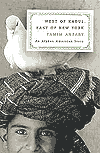| |
BOOK
REVIEW
Afghanistan:
The lost homeland
West of Kabul, East
of New York: An Afghan American Story,
by Tamim Ansary
Reviewed by Sreeram Chaulia
 One
day after September 11, 2001, Afghan American
writer Tamim Ansary sent a moving email pleading
against chauvinistic reactions demanding
punitive revenge for the terror attacks. Enraged
American voices were accosted with Ansary's
submission that the Afghan people were pitifully
harmless, "strong contenders for the
poorest people on earth award". Those
rooting for "bombing Afghanistan back to
the stone age" were informed that "the
Soviets took care of it already". This
email message reached the inboxes of millions of
netizens within a week and became the crown
jewel of the peace movement all over the world. One
day after September 11, 2001, Afghan American
writer Tamim Ansary sent a moving email pleading
against chauvinistic reactions demanding
punitive revenge for the terror attacks. Enraged
American voices were accosted with Ansary's
submission that the Afghan people were pitifully
harmless, "strong contenders for the
poorest people on earth award". Those
rooting for "bombing Afghanistan back to
the stone age" were informed that "the
Soviets took care of it already". This
email message reached the inboxes of millions of
netizens within a week and became the crown
jewel of the peace movement all over the world.
Ansary's book is an extension of that famous
missive, a small reminder of the essential
gentleness of the Afghan people who have
suffered endlessly at the hands of great powers,
neighbors and militant Islam. It is also a
personal testament of the author's divided self,
born of an Afghan father and an American mother,
and his lifelong identity crisis of being
neither fully Afghan nor fully American. Above
all, it is a requiem to a lost homeland where he
grew up in the 1950s and 1960s.
Born in 1948 to a Kabul-based aristocrat, Ansary
was brought up in a collective culture where the
"group self" was as real as the
"individual self" and extended clans
gave members their identity. "You in
particular were just a leaf, a bud [that
belonged to] the branch, the trunk, the tree
itself: your people." (p 17) Genealogy and
family stories were the warp and woof of the
fabric that gave the Ansary clan its oneness and
exclusivity. Western concepts of nucleus family
and dysfunctional family had no meaning.
In the Afghanistan of that era, "there was
no Ministry of Vice and Virtue. No-one was under
the gun to pray". (p 20) Ansary stole
grapes and mulberries, played cricket with a wad
of rags wrapped in twine and learnt heuristic
doctrinal stories at school. In 1957, Ansary's
father moved to Lashkargah to run a development
project in the Helmand valley. The shift
disrupted intricate social webs of the clan, but
the nine-year-old boy matured: "Even as
children, we knew that loss would deepen us.
That's what it means to be an Afghan ... ground
to dust beneath the wheels of inexorable
kismet". (p 61) Lashkargah was teeming with
Americans working in the ambitious
government-sponsored modernization program.
"Among the Afghans, we were Americans; with
the Americans if we weren't Americans either,
what were we? We remained Americans with an
asterisk." (p 67) Attending the expatriates
school, Ansary "felt like an American wanna-be,
my face pressed to a window pane, gazing into
someone else's living room". (p 72)
In 1959, the "germ of the West" was
sown when then premier Mohammad Daoud declared
the chad'ri (veil) un-Islamic and
endorsed co-education schools as government
policy. Conservative mullahs were so agitated by
these reforms that a bloody rebellion broke out
in Kandahar. Retrospectively, the social
faultlines that were to curse Afghanistan were
laid in these years. Western aid poured into the
cities and bred a generation of left-leaning
progressive youngsters who were jobless, but the
countryside was largely untouched. "When
the communists took over, they were oblivious to
traditional Afghan society. The gulf became an
ocean." (p 85)
Ansary witnessed several confrontations and
ruckuses in school over segregation of men and
women. Putting on psychoanalyst Sigmund Freud's
specs, he came to the conclusion that "it
is on the issue of relationship between the
sexes that Islam and the West have parted ways,
and parting ways on this, they have parted ways
on everything". (p 92)
In 1963, Ansary won a school scholarship in
America and his family left Afghanistan to
resettle in Washington DC. In the US, "I no
longer felt the bicultural alienation of my
childhood." (p 104) But Afghanistan refused
to fade from his mind. In 1979, the year of the
Iranian revolution, he saved enough money as a
writer to plan a voyage through the Islamic
world. Ansary's brother had earlier gone to
Pakistan, the "wasp's nest of Islamic
enthusiasm", and returned converted to
orthodox fundamentalism. Ansary asked himself,
"If he had been converted, could I be
converted too?" (p 118) Wanting to go as
close to Afghanistan as possible, he put on the
cover story of a lapsed Muslim looking for his
roots.
Disembarking first at Tangier, Morocco, Ansary
found himself an object of excitement owing to
his origins. Young men on streets confronted him
shouting, "Russians! Bang bang! Muslims
support Afghanistan." (p 127) Moroccans
also foresaw the future direction of holy war by
rejecting Ansary's bifurcation between Afghan
and Iranian hardliners on the basis of fighting
different enemies. "Soviets, Americans -
same thing," he was told. (p 132)
Revivalist Muslims agonized about the decline in
observance of the sunnah (ways of the
Prophet) as the main cause for "why the
state of Muslims has fallen so low". (p
135) A stock lament in Morocco was that
religious scholars had "sold themselves to
the governments" instead of speaking their
hearts.
In bordering Algeria, Ansary came across similar
pan-Islamic militancy on the streets.
"Muslims triumphant, Western dogs go home.
Muslim power hooray, Yankee nothing." (p
164) A molluk (low-ranking cleric) in
Tunisia told Ansary that before judgment day
arrived, "the whole world will yield to
Islam at last, yes"! (p 181)
Ansary was in two minds about the theory that
economic deprivation and poverty were the
ballast for Islamic fundamentalism. "Who
were we to claim that all this rage and fervor
wasn't really about tenets and belief, but about
economics?" (p 143) Islam proclaims that
the truth about human history was incarnated in
a historical moment from which we are receding
ever since. The mythical value given to the
"first Muslim community" in 7th
century Arabia meant that "renewal
movements in Islam have tended to look backward
... to preach the doctrine of getting back to
the way it was". (p 149)
Yet, when Ansary moved to Turkey, economic
crisis was visibly stoking an Islamist
renaissance. Growing desperation about the
country's falling currency in the early 1980s
was pushing middle and lower classes "back
down into the Islamic past, down into the
Ottoman world they thought they had
escaped". (p 195) One woman reflected the
desperation-induced turn to Islamism thus:
"It doesn't seem like any human power can
solve this problem. It's going to take God
almighty." (p 200) So unnerved was Ansary
with all the hectic travelling and conservatism
that he decided to return to America without
going further east to Iran and Afghanistan.
"The Islamic world was someone else's. Not
mine." (p 219)
What particularly horrified Ansary about the new
radical Islam were gross fabrications of history
and blanket condemnation of people of other
faiths as agents of satan who subjugate
believers and eliminate god's message from the
earth. "Once you are in such a house, you
can never get another message from the outside
world." (p 258) Exasperated at his
brother's tunnel vision and blind acceptance of
the Islam-versus-rest of the world story, Ansary
blurted out: "What was he going to do when
his jihad reached Washington? Are you going to
kill mommy?" (p 259)
As the Soviet invasion and the mujahideen
resistance ravaged his fatherland in the 1980s,
Ansary could not disconnect himself entirely
from Afghanistan. "Some Afghan self inside
me woke up and realized it didn't want to
die." (p 223) He organized refugee aid
committees, knowing fully in the mid-1980s that
the camps in Pakistan were an "unwholesome
soil" that would breed the barbaric Taliban
one day. Ansary shared dreams of peace in 1992
with other non-resident Afghans, but soon
hunkered into misery as intra-mujahideen
struggles destroyed whatever little was left in
infrastructure and social capital.
All through the 1990s, when the world had
forgotten it, "Afghanistan never vanished
for me; it remained a shimmering thread in the
embroidery always." (p 263) Ansary grew
emotional reading and warning about new
foreigners invading his destitute country, Arabs
and Pakistanis this time. He now hopes that
something new and peaceful will emerge out of
the rubble that Afghanistan is today. Yet,
"the lost world will not be
reconstituted". As Afghan folklore goes,
life's only true trait is migzarad - it
flows on past without ever returning.
West of Kabul, East of New York has the
simplicity of a film of Iranian director Abbas
Kiarostami and the complexity of what
psychologists call "liminality
experience", where the subject has one foot
in a lost past and one in an unsure present.
Diaspora writing cannot get better than this.
Nostalgia permeates every page. If the reader is
Afghan, their eyes will brim over with tears.
West of Kabul, East of New York: An
Afghan American Story,
by Tamim Ansary. Picador
Publishers, New York, March 2003. ISBN:
0312421516. Price US$13, 293 pages.
(©2003 Asia Times Online Co, Ltd. All rights
reserved. Please contact[email protected]
for information on our sales and syndication
policies.) |
| |
|
|
 |
|




 One
day after September 11, 2001, Afghan American
writer Tamim Ansary sent a moving email pleading
against chauvinistic reactions demanding
punitive revenge for the terror attacks. Enraged
American voices were accosted with Ansary's
submission that the Afghan people were pitifully
harmless, "strong contenders for the
poorest people on earth award". Those
rooting for "bombing Afghanistan back to
the stone age" were informed that "the
Soviets took care of it already". This
email message reached the inboxes of millions of
netizens within a week and became the crown
jewel of the peace movement all over the world.
One
day after September 11, 2001, Afghan American
writer Tamim Ansary sent a moving email pleading
against chauvinistic reactions demanding
punitive revenge for the terror attacks. Enraged
American voices were accosted with Ansary's
submission that the Afghan people were pitifully
harmless, "strong contenders for the
poorest people on earth award". Those
rooting for "bombing Afghanistan back to
the stone age" were informed that "the
Soviets took care of it already". This
email message reached the inboxes of millions of
netizens within a week and became the crown
jewel of the peace movement all over the world.


